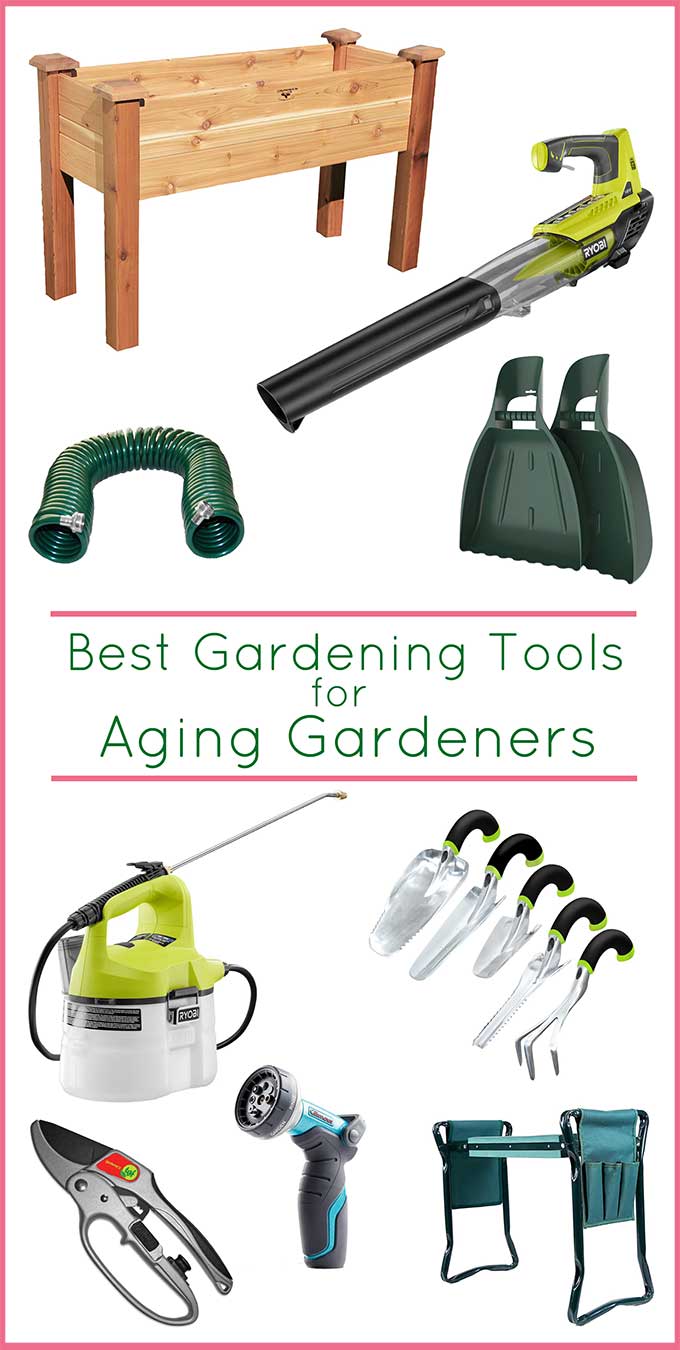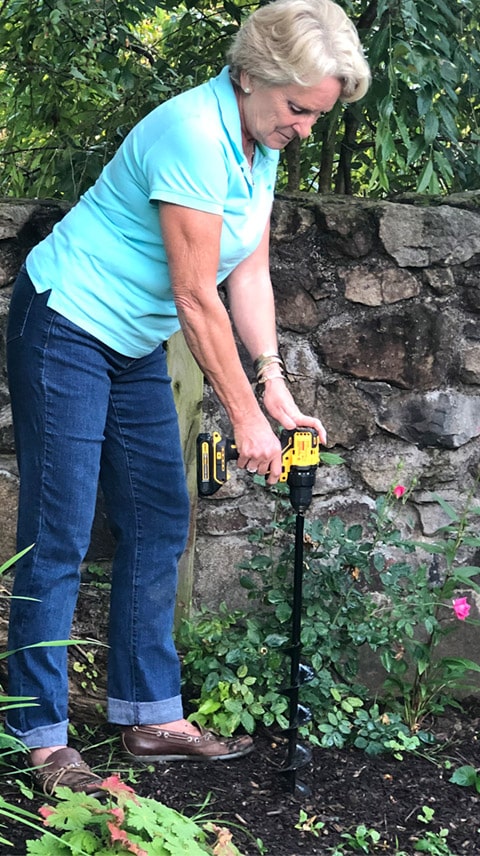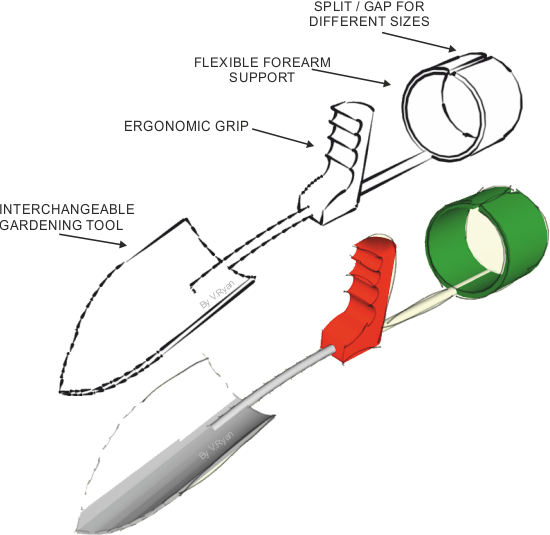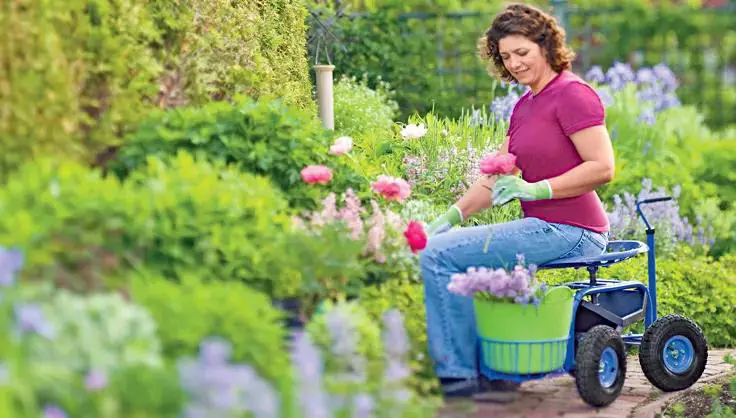Are you or a loved one passionate about gardening but finding it increasingly challenging as the years go by? Don’t let age slow down your green thumb!
With the right gardening tools designed specifically for the elderly, you can continue to enjoy the joys of gardening with ease and comfort. Imagine tending to your beloved plants without the usual strain or discomfort. Picture yourself effortlessly pruning, planting, and watering, all while feeling supported and secure.
This article will introduce you to the must-have gardening tools that can transform your gardening experience. Discover how these tools can make your garden a haven of peace and productivity, ensuring that your passion for plants never fades. Ready to dig into a world where gardening remains a delightful, stress-free hobby? Keep reading to unlock the secrets to a more accessible and enjoyable gardening journey.
JUMP TO TOPIC
Ergonomic Designs
Gardening can be a relaxing hobby for the elderly. Yet, it requires tools that are easy to handle and comfortable to use. Ergonomic designs play a crucial role in ensuring gardening remains enjoyable. These designs focus on reducing strain and enhancing efficiency. They allow older adults to garden without discomfort or fatigue.
Importance Of Ergonomics
Ergonomics is all about comfort and safety. It helps prevent injuries and reduces muscle strain. For seniors, it means gardening with less effort and more joy. Properly designed tools can make a big difference. They allow longer gardening sessions without pain. Ergonomics ensures that tools fit naturally in the hand.
Features To Look For
Seek tools with cushioned grips. Soft handles reduce pressure on the hands. Lightweight tools are easier to maneuver. This prevents strain on the arms and shoulders. Adjustable handles offer flexibility. They allow personalized comfort. Consider tools with extended handles. This helps avoid bending and stooping. Look for tools with bright colors. They are easier to spot among plants.
Lightweight Tools
Elderly gardeners benefit from lightweight tools that make gardening easier and more enjoyable. These tools reduce strain on joints and muscles, ensuring a comfortable experience. Ideal for those with limited strength, they promote independence and encourage continued engagement in gardening activities.
Gardening can be a delightful hobby, especially for the elderly, offering both physical activity and a sense of accomplishment. However, heavy tools can quickly turn a pleasant experience into a daunting task. That’s where lightweight tools come in handy. Designed with ease and comfort in mind, these tools are perfect for those who might find traditional gardening equipment cumbersome. Imagine spending more time enjoying your garden and less time struggling with heavy gear. Lightweight tools can make this a reality.Benefits Of Light Materials
Choosing tools made from light materials can significantly enhance your gardening experience. These tools reduce strain on your arms and back, allowing you to garden for longer periods without discomfort. Materials like aluminum and plastic are not only light but also durable and rust-resistant. This means your tools will last longer and require less maintenance, saving you both time and effort. Moreover, lightweight tools are easier to handle, making them ideal for people with arthritis or limited strength. Have you ever felt fatigued just ten minutes into gardening? Switching to lighter tools could be a game-changer for you.Top Lightweight Options
There are several excellent lightweight gardening tools that can transform your gardening routine. A popular choice is the aluminum hand trowel, which is light and easy to maneuver. Its sturdy design makes planting and digging tasks much more manageable. Another great option is the telescopic lightweight rake. It allows you to adjust the length according to your comfort, reducing the need to bend or stretch excessively. For pruning tasks, consider using lightweight shears. These are often designed with ergonomic handles, providing extra comfort and reducing hand fatigue. If you enjoy planting flowers, a plastic watering can with a long spout is perfect. It’s easy to carry around and helps you water those hard-to-reach spots without hassle. Are there any lightweight tools you’ve used that have made a difference in your gardening? Share your experience in the comments below. By incorporating these lightweight options, your gardening experience can become not just easier, but more enjoyable.Easy Grip Handles
Gardening can be a delightful hobby, especially for the elderly. However, it often comes with its challenges, like dealing with tools that are hard to grip. That’s where easy grip handles come in, designed to make gardening accessible and enjoyable for everyone. These handles not only enhance comfort but also ensure safety, reducing the risk of strain and injury. Imagine your favorite gardening tool transforming into a more user-friendly version, simply because of a better handle design. Wouldn’t that make your gardening sessions more pleasurable?
Handle Designs For Comfort
When choosing gardening tools, pay attention to the handle design. Ergonomically designed handles fit naturally in your hand, minimizing the effort needed to hold and use them. These handles often feature contours that align with the natural shape of your hand.
Some tools come with padded grips, offering extra cushioning. This is particularly beneficial for seniors who may have arthritis or other hand-related issues. A friend once told me how swapping to padded handles made their gardening feel like a breeze.
Materials For Optimal Grip
The material of the handle plays a crucial role in grip efficiency. Rubber or silicone grips are popular choices as they provide excellent traction, even when wet. Imagine trying to plant after rain; slippery handles can lead to mishaps.
Wooden handles, while traditional, often lack this grip quality unless treated with a non-slip coating. Consider how different materials react in various weather conditions. Would you prefer a handle that stays firm in your grip regardless of the season?
Choosing the right gardening tools can transform your gardening experience. Easy grip handles make it possible to garden with ease, allowing seniors to focus on what truly matters—the joy of tending to their plants.

Credit: www.houseofhawthornes.com
Adjustable And Extendable Tools
Gardening is a beloved activity for many elderly individuals. With age, physical limitations can hinder the joy of gardening. Adjustable and extendable tools offer a solution. These tools are designed to cater to the changing needs of aging bodies. They make gardening more comfortable and enjoyable.
Advantages Of Adjustability
Adjustable tools can be tailored to various heights and preferences. This flexibility reduces strain on the back and knees. Elderly gardeners can work in a comfortable position. Adjustability also helps in tackling different gardening tasks efficiently.
Tools that adapt to individual needs enhance safety. Less bending or stretching minimizes the risk of injuries. Adjustable tools offer convenience to elderly users, making gardening accessible.
Popular Extendable Tools
Extendable tools are favored for their versatility. They can reach high or low areas easily. A popular choice is the extendable pruning shears. They allow trimming without excessive stretching. Telescopic rakes are another favorite. They adjust to suit various garden spaces.
Extendable hoes make tilling soil a breeze. These tools help maintain balance while gardening. They are lightweight, reducing fatigue during use. For elderly gardeners, extendable tools are a practical solution.
Safety Features
Gardening is a rewarding hobby, especially for the elderly. Yet, safety in gardening is crucial. Proper tools can make gardening safer and more enjoyable. Safety features in gardening tools help reduce the risk of injuries. Let’s explore the essential safety elements and ways to prevent injuries.
Essential Safety Elements
Gardening tools should have non-slip handles. They offer a firm grip. This minimizes the chance of slipping. Lightweight tools are also important. Heavy tools can strain muscles. Adjustable tools fit various hand sizes. This ensures a comfortable hold. Tools should have smooth edges. Sharp edges can cause cuts.
Durable materials ensure the tools last longer. Sturdy tools do not break easily. This reduces the risk of accidents. Brightly colored tools are easier to find. They help prevent stepping on them by accident. Locking mechanisms are vital. They prevent unwanted opening or closing.
Preventing Injuries
Proper storage reduces the risk of falls. Keep tools in a designated area. Use a tool bag or shed. This keeps them organized. Regular maintenance is essential. Check for rust and wear. Rusty tools can slip and cause harm. Wear gloves while gardening. They protect hands from blisters and cuts.
Stretch before starting. It prepares muscles for work. Take breaks often. Resting prevents overexertion. Use ergonomic tools. They are designed for comfort. This reduces strain on hands and wrists. Be mindful of surroundings. Watch for uneven ground. Avoid bending for long periods. Use a stool or kneeling pad.

Credit: powerplanter.com
Electric And Battery-powered Options
Gardening can be a joyful activity for the elderly. Yet, traditional tools may be challenging for them. Electric and battery-powered options offer a fantastic alternative. These tools can make gardening easier and more enjoyable. They come with various benefits, such as reduced physical strain. They also offer ease of use, which is crucial for seniors. Let’s explore their features and recommended models.
Ease Of Use
Electric tools are lighter than manual ones. This makes them easier to handle. Battery-powered tools do not require cords. This provides more freedom while gardening. They start with just a button press. No need to pull cords or apply force. These features make them ideal for those with limited strength. The elderly can garden longer without tiring quickly.
Recommended Models
Many models are suitable for seniors. The Black & Decker LCS1240 is a popular choice. It’s a battery-powered chainsaw with easy controls. Another option is the Greenworks 20312 chainsaw. It is lightweight and easy to maneuver. For trimmers, consider the WORX WG163 GT. It’s simple to use and has adjustable handles. These models are user-friendly and efficient. They offer excellent support for elderly gardeners.
Maintenance Tips
Maintaining gardening tools is crucial for elderly gardeners. Proper care extends their lifespan and ensures safe use. Regular upkeep also makes gardening more enjoyable. This section covers essential maintenance tips. These tips help keep tools in top shape.
Cleaning And Storage
After each use, clean tools with a damp cloth. This removes dirt and prevents rust. Dry them thoroughly to avoid moisture damage. Store tools in a dry, cool place. Use hooks or racks for easy access. Proper storage prevents accidents and extends tool life.
Regular Checks And Repairs
Inspect tools regularly for wear and tear. Look for loose screws and damaged handles. Tighten screws with a screwdriver. Replace worn parts promptly to maintain safety. Sharpen blades regularly for efficient cutting. A sharp blade makes gardening easier and safer for elderly users.

Credit: technologystudent.com
Recommendations For Specific Tasks
Selecting the right gardening tools can help elderly individuals maintain their gardens with ease. Lightweight, ergonomic tools reduce strain and promote comfort. Consider tools with long handles for better reach, and cushioned grips for added comfort.
Gardening provides joy and relaxation for many elderly individuals. The right tools make specific tasks easier and safer. Choosing the right tool enhances comfort and efficiency. Let’s explore tools suitable for pruning, trimming, weeding, and planting.Pruning And Trimming
Pruning and trimming require precision and ease of use. Lightweight pruning shears reduce strain on hands and wrists. Look for models with ergonomic handles. Ratchet pruners are ideal for tougher branches. Their cutting mechanism requires less force. Consider bypass pruners for clean cuts. They work well on green, growing plants. Long-handled loppers offer extended reach. They are perfect for taller branches. Electric hedge trimmers provide effortless trimming. Choose models with safety features.Weeding And Planting
Weeding and planting are crucial for healthy gardens. Kneeling pads offer comfort during these tasks. They protect knees on hard surfaces. Long-handled weeders reduce bending and stretching. They help reach weeds with ease. Ergonomic hand tools are essential for planting. Their comfortable grip minimizes hand fatigue. Consider seed planters with easy-squeeze handles. They simplify seeding tasks. Raised garden beds reduce the need to bend. They are perfect for those with mobility challenges. Gardening gloves with extra padding protect hands. They provide grip and reduce the risk of blisters.Frequently Asked Questions
What Are The Best Gardening Tools For Elderly?
The best gardening tools for elderly are lightweight, ergonomic, and easy to use. Look for tools with long handles to reduce bending and kneeling. Tools with soft grips can help prevent strain and fatigue. Brands like Fiskars and Radius Garden offer senior-friendly options.
How Can Gardening Tools Improve Elderly Safety?
Gardening tools designed for elderly can improve safety by reducing physical strain. Ergonomic handles and lightweight materials help prevent injuries. Tools with long handles minimize the need for bending. Non-slip grips ensure better control, reducing the risk of accidents.
Are There Adaptive Gardening Tools For Seniors?
Yes, adaptive gardening tools are specifically designed for seniors. These tools often feature ergonomic designs and extendable handles. They help reduce physical strain and improve comfort. Look for tools with padded grips and lightweight construction for easier use.
What Features To Look For In Elderly Gardening Tools?
Look for features like ergonomic handles, lightweight materials, and long-reach designs. Non-slip grips and adjustable lengths are also important. These features help reduce physical strain and make gardening easier and safer for seniors.
Conclusion
Gardening can bring joy to seniors. Right tools make it easier and safer. Ergonomic handles help reduce strain. Lightweight tools prevent fatigue. Long-reach tools are perfect for hard-to-reach spots. Kneeling pads add comfort for prolonged tasks. Adjustable tool heights suit different needs.
Gardening gloves protect hands from cuts. Always choose tools designed for seniors. They enhance the gardening experience. Keep safety and comfort as priorities. Encourage loved ones to enjoy gardening. It’s a great way to stay active and engaged. Share these tips with friends.
Help seniors find joy in their gardens.

